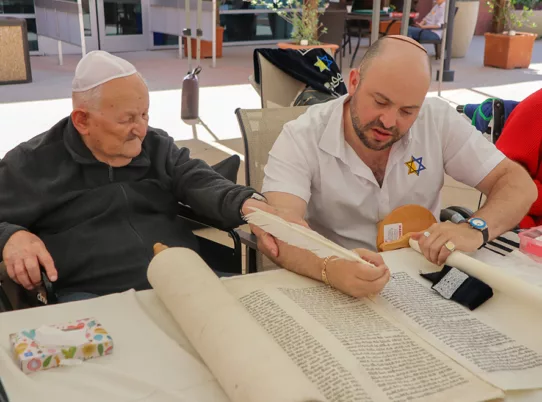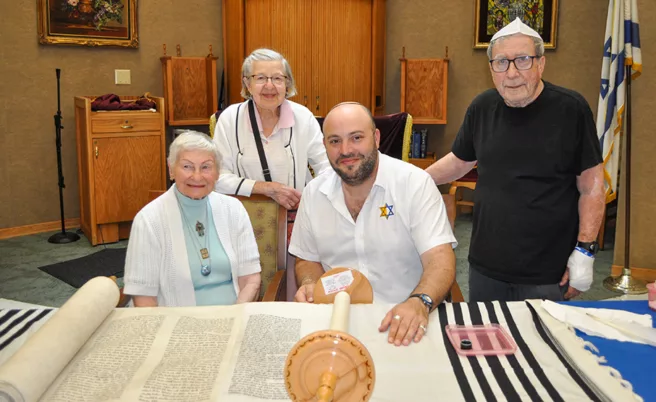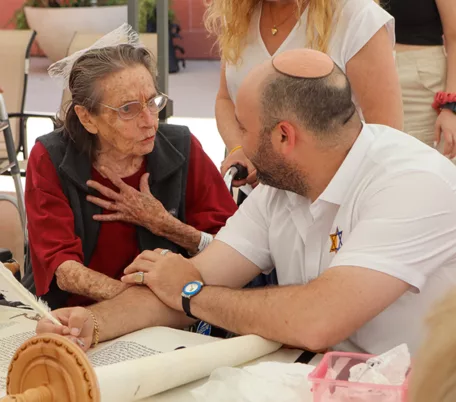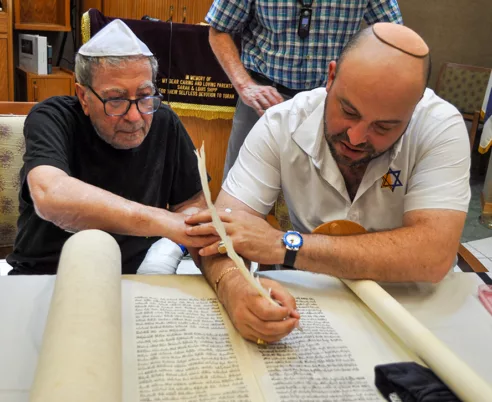Torah Scroll Comes to Los Angeles Jewish Health


A Cherished Relic that Survived the Holocaust Comes to Los Angeles Jewish Health
A Cherished Relic that survived the Holocaust Comes to Los Angeles Jewish Health
In addition to the thousands of older adults served by Los Angeles Jewish Health (LAJH) for more than a century, it has been a special honor to provide comfort and care to hundreds of Holocaust survivors who have called LAJH home. Some of these cherished residents have recounted their powerful stories over and over again, in discussion groups, public speaking engagements, recordings for the Shoah Foundation and the Library of Congress. Others, choose not to speak about this dark time in their family’s and the world’s history.
Recently, an extraordinary event took place at LAJH when the thirty survivors in residence were given the opportunity to not only touch a sacred piece of history but to join in its rejuvenation, so that it can continue to educate others on the atrocities of the past so that they might never be repeated. This powerful message is brought to life through an ancient Torah scroll that has been severely damaged by time, neglect and war.
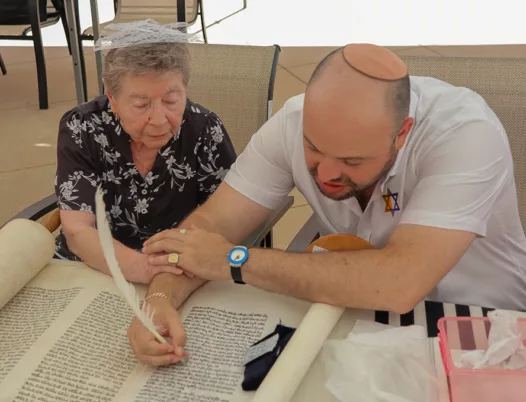
Jonny Daniels, founder of an international nonprofit, From the Depths, travels the world seeking out survivors of the Holocaust to take part in this restoration project. With a mission of preserving the memory of the Holocaust and using its lessons to shape a better future, Daniels is a scribe specially trained in the art of writing holy texts onto parchment.
This story began when a Torah scroll, the holiest book in Judaism, remained hidden for 70 years at a home in a remote Polish village until university students visiting for another project came upon it.
While visiting with a local couple the students learned that long ago the family’s neighbors had been religious Jews. Before being deported during the war they had asked their non-Jewish neighbors to keep the Torah scroll safe until they returned from the camps. This is an example of the critical role so many righteous non-Jews played during this time in history.
The Rabbi never returned. Over the years, the scroll’s condition greatly deteriorated. During the past 70 years, out of necessity, half of the Torah had been utilized by the family for items such as rags, and insoles for shoes.
Now, the family decided to share the scroll with these students. They lifted cushions from a couch and revealed a brown-paper wrapped Torah scroll hidden there in 1939 when the Jewish population of approximately 280 was deported and murdered.
Daniels describes his work this way, “We work extensively in Eastern Europe, where we seek to rediscover hidden Jewish heritage.” “When we located this Torah, which managed to withstand the ravages of Nazi aggression, we knew the most fitting way to honor it would be for Holocaust survivors to participate in rewriting it. We are dedicated to finding those survivors who are left and to having them help make the Torah whole again.”
So, on a recent very special afternoon in the outdoor courtyard and synagogue of Los Angeles Jewish Health, the emotion was palpable, as survivors, who trace their origins to Poland, Russia, Germany and Hungary, gathered. Then, one by one, they were each given the honor of touching the Torah, then pulling it in closer to them. Each then placed their hands on Daniels’ arm as he carefully inked new letters on fresh parchment to replace the portion of the scroll that had been desecrated. He patiently spoke with each of them (many in their native languages of Russian, Yiddish and Hebrew), explaining that they were fulfilling a Jewish commandment to write the Torah. All who had gathered, the survivors and staff, were overflowing with emotion with many wiping tears from their eyes.
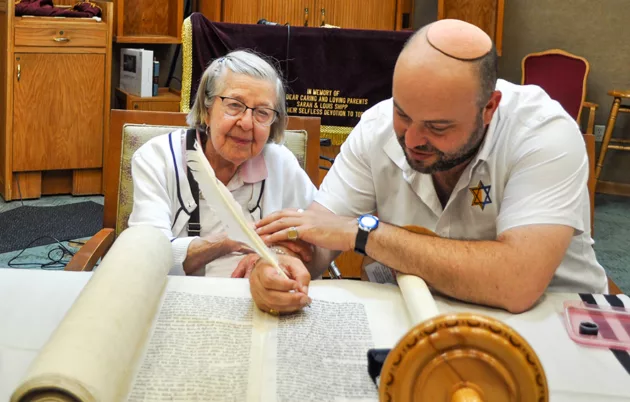
Chief Mission Officer for Los Angeles Jewish Health Rabbi Karen Bender, was clearly moved by the gathering and spoke about the significance and honor of having the Torah make its way to LAJH, and the extraordinary resilience of the Jewish people and religion.
“Like some of our LAJH residents, this Torah is a survivor of the Holocaust. Bearing witness to our survivors writing letters in a Torah scroll that is being revived, repaired, and completed in honor of them and by them was one of the most meaningful Jewish experiences of my life,” she said. “I felt that they were doing this in honor of the six million Jews who perished during the Holocaust, including and especially their own family members—and, frankly, including even my own family members who died.”
In summing up the mission of From the Depths, Daniels describes, “The Torah is what binds us as a people, what connects us as Jews from one generation to the next. To find this Torah scroll, even in its current condition, was completely overwhelming. This is a clear symbol of triumph, showing again the victory of the Jewish spirit over those who try to exterminate us,” he said.
After its repair is complete, Daniels intends to donate the scroll to the Knesset (Israeli House of Representatives) in a ceremony attended by politicians and Holocaust survivors from throughout the world.
